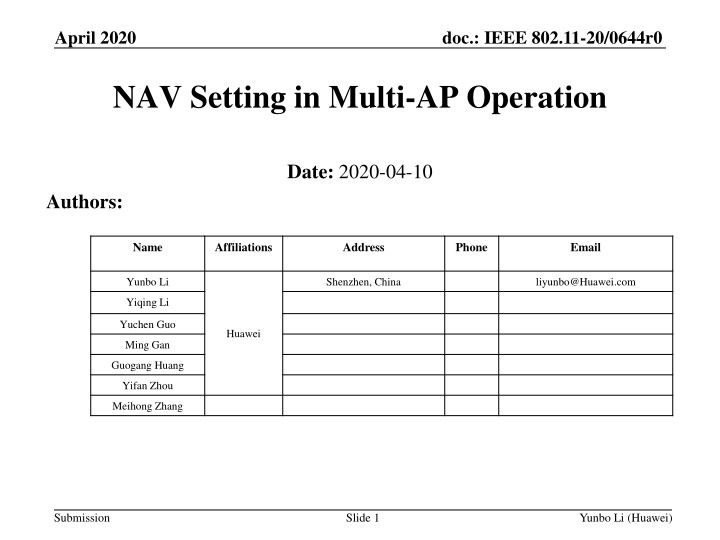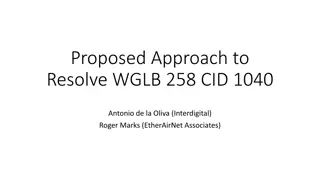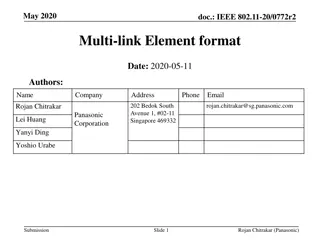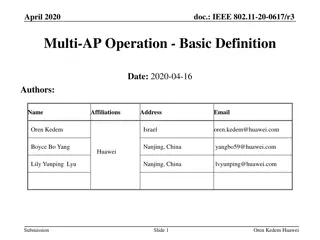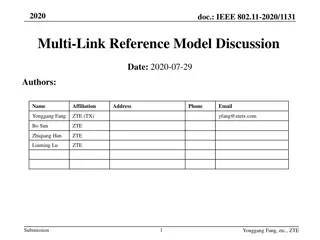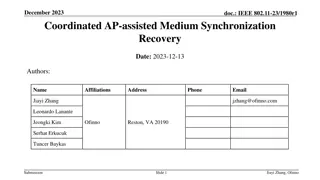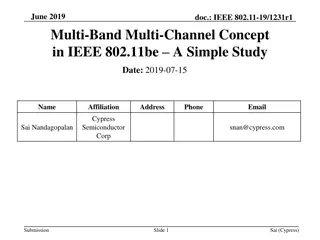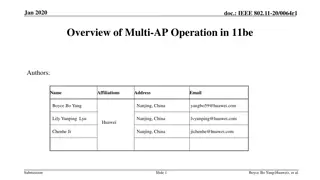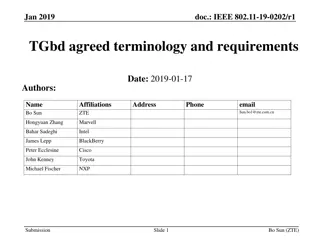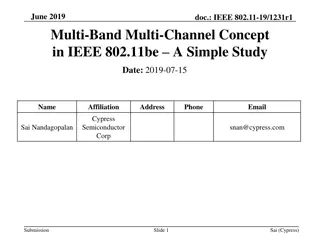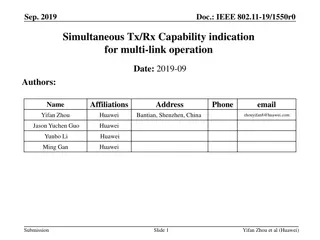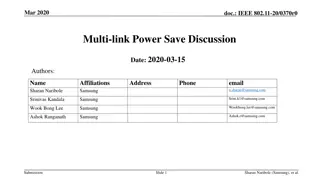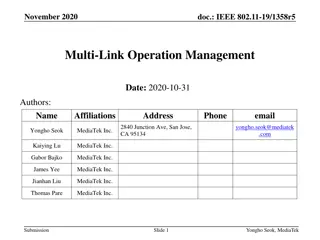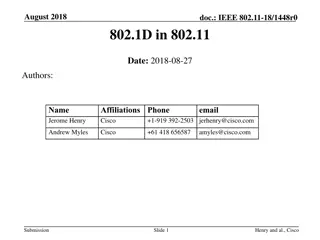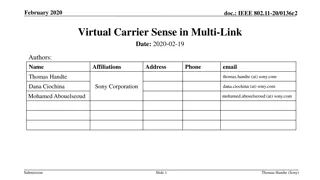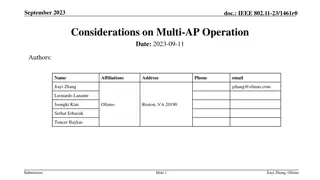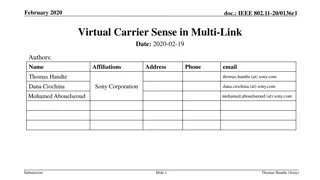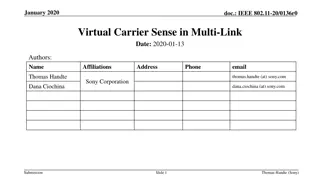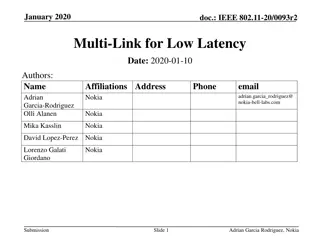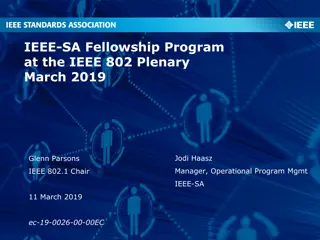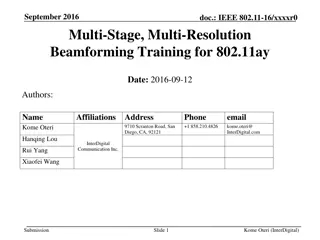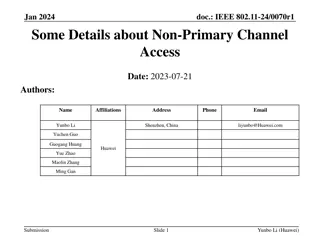IEEE 802.11-20/0644r0 NAV Setting in Multi-AP Operation
This document discusses the NAV setting in multi-AP operations within the IEEE 802.11-20 standard. It covers terminology, background information, and proposed solutions to address issues related to AP cooperation and UL AP coordination. The authors suggest adjustments to NAV rules and frame durations to enhance AP and STA interactions in a multi-AP environment.
Download Presentation

Please find below an Image/Link to download the presentation.
The content on the website is provided AS IS for your information and personal use only. It may not be sold, licensed, or shared on other websites without obtaining consent from the author.If you encounter any issues during the download, it is possible that the publisher has removed the file from their server.
You are allowed to download the files provided on this website for personal or commercial use, subject to the condition that they are used lawfully. All files are the property of their respective owners.
The content on the website is provided AS IS for your information and personal use only. It may not be sold, licensed, or shared on other websites without obtaining consent from the author.
E N D
Presentation Transcript
doc.: IEEE 802.11-20/0644r0 April 2020 NAV Setting in Multi-AP Operation Date: 2020-04-10 Authors: Name Affiliations Address Phone Email Yunbo Li Shenzhen, China liyunbo@Huawei.com Yiqing Li Yuchen Guo Huawei Ming Gan Guogang Huang Yifan Zhou Meihong Zhang Submission Slide 1 Yunbo Li (Huawei)
doc.: IEEE 802.11-20/0644r0 April 2020 Terminology Below terminologies will be used in this presentation. Some of them haven t pass motion, just use them here for simplicity. Sharing AP: an EHT AP which obtains a TXOP and initiates the Multi-AP coordination; [Motion 73] [1] Shared AP: an EHT AP which is coordinated for the Multi-AP transmission; [Motion 73] Sharing STA: a STA that associates with the sharing AP, and participates in the AP cooperation procedure; Shared STA: a STA that associates with a shared AP, and participates in the AP cooperation procedure; Shared TXOP: a TXOP during which AP cooperation happens Note: a sharing STA or a shared STA may be a legacy STA depends on the AP cooperation procedure. Submission Slide 2 Yunbo Li (Huawei)
doc.: IEEE 802.11-20/0644r0 April 2020 Background The concept of some simple AP cooperation scheme already be accepted E.g. Co-OFDMA, Co-TDMA, Co-SR NAV rules need to be modified in UL AP cooperation procedure as mentioned in [2]; The reason is when sharing AP setup a TXOP, the shared STA set basic NAV, then later when the shared STA is triggered by the shared AP to do UL transmission in the same TXOP, the shared STA can not reply TB PPDU anymore; Coop Init Trigger 1 BA1 Sharing AP BA2 Coop Resp Trigger 2 Shared AP Can not be transmitted, because of basic NAV is not 0 TB PPDU 1 Sharing STA TB PPDU 2 Set basic NAV Shared STA Submission Slide 3 Yunbo Li (Huawei)
doc.: IEEE 802.11-20/0644r0 April 2020 Solution Option 1 The Duration field of Coop Init frame sets a time that is earlier than the start time of TB PPDU frame; The Duration fields of Trigger 1&2 are extended to set a time that covers TB PPDUs and BAs; Before shared STA replies TB PPDU2, the basic NAV set by sharing AP already expires; The duration value for Trigger 2 frame needs to be carried in Coop Init frame. Because shared AP is not the TXOP holder, it can not decide how to extend the TXOP. Duration set by Coop Init Duration set by Trigger 1&2 Coop Init Trigger 1 BA1 Sharing AP BA2 Coop Resp Trigger 2 Shared AP TB PPDU 1 Sharing STA TB PPDU 2 Set basic NAV Shared STA Submission Slide 4 Yunbo Li (Huawei)
doc.: IEEE 802.11-20/0644r0 April 2020 Solution Option 2 When sharing AP transmits the Coop Init frame, shared STA sets basic NAV base on that frame; Later, when the shared STA is triggered by the shared AP, the shared STA can temporarily ignore the basic NAV if the last PPDU that cause the basic NAV update is transmitted by the sharing AP; The basic NAV is still there, the shared STA is not allowed to start contention before basic NAV reaches 0. Duration set by Coop Init Coop Init Trigger 1 BA1 Sharing AP BA2 Coop Resp Trigger 2 Shared AP TB PPDU 1 Sharing STA Temporary ignore the basic NAV if it is set by sharing AP TB PPDU 2 Set basic NAV Shared STA Submission Slide 5 Yunbo Li (Huawei)
doc.: IEEE 802.11-20/0644r0 April 2020 Drawbacks of Solution 2 Solution 2 needs to change the NAV operation rules of shared STA, so it can not be used for legacy STAs A shared STA could be legacy STA in Co-OFDMA, Co-TDMA, Co-SR et.al; If shared STA allows to ignore the sharing AP s basic NAV when it receive a Trigger frame from shared AP, it will cause some problem E.g. when sharing AP s TXOP initiate frame (which may not intent to form a shared TXOP) failed at shared AP side, shared AP may start a Trigger frame by contention. (see below figure) Shared AP Sharing AP RTS RTS Trigger RTS CTS Shared STA Sharing STA Submission Slide 6 Yunbo Li (Huawei)
doc.: IEEE 802.11-20/0644r0 April 2020 Conclusion NAV rules need to be modified in UL AP cooperation procedure because shared STA may set basic NAV by sharing AP, so the shared STA can not be triggered to do UL transmission; Two potential options are provide for discussion Opt 1: Sharing AP set NAV step by step in UL AP cooperation procedure Opt 2: add rule to allows shared STA to ignore the basic NAV that set by sharing AP Opt 1 is transparent to shared STA, so legacy STA may also involve into AP cooperation procedure; Opt 2 can not be supported by legacy shared STA, and may also cause interference to sharing AP s transmission in some case; Opt 1 is preferred. Submission Slide 7 Yunbo Li (Huawei)
doc.: IEEE 802.11-20/0644r0 April 2020 Straw Poll 1 Which option do you prefer to for NAV setting in UL AP cooperation procedure? Opt 1: Sharing AP set NAV step by step in UL AP cooperation procedure Opt 2: add rule to allows shared STA to ignore the basic NAV that set by sharing AP Opt 3: Other solution Opt 4: need more discussion Submission Slide 8 Yunbo Li (Huawei)
doc.: IEEE 802.11-20/0644r0 April 2020 Reference [1] 11-19-1262-08-00be-specification-framework-for-tgbe [2] 11-20-0475-00-00be-coordinated-txop-sharing-in-ul Submission Slide 9 Yunbo Li (Huawei)
